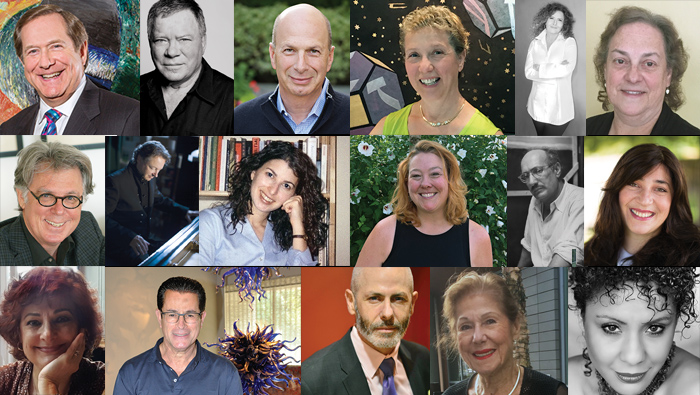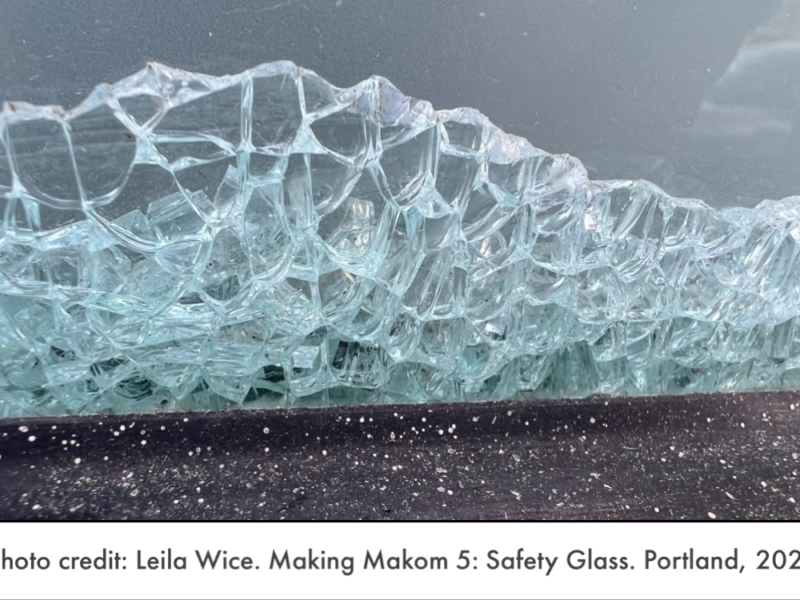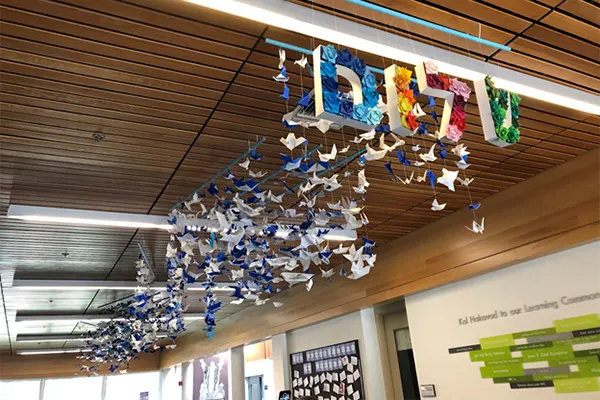
As part of our celebration of the arts, Oregon Jewish Life asked philanthropists, collectors, artists and educators to share their ideas on: “How do the arts benefit society and/or the individual?”
On the following pages, read their replies as well as artists comments from our archives:
Jordan Schnitzer
Philanthropist andart collector
“Arts are the best of what we do in society and the inspiration we receive through visual arts, dance, music and theater enriches our hearts and souls to help us be better creative problem solvers in the issues we face in our daily lives.”
Gordon Sondland
Chair of the Governor’s Office of Film and Television in Kulongoski, Kitzhaber and Brown administrations
“The arts, in whatever form they take, create a vehicle through which society can express its hopes, fears, trends and the beauty of life. Without the arts, a community is just a collection of buildings inhabited by people who have no method by which to express their humanity to their own community and to the world.”
Sara Harwin
International artist living and working in Portland
“The arts take us on a journey of the mind and the spirit. The steady light of everyday work is refracted by the prism of inspiration, shifting into a shimmer of beauty that becomes an infinite rainbow of colors. This transcendence into a timeless, eternal and universal reality provides nourishment to the soul.”
Mark Rothko
(1903-1970)
Portland-raised artist whose first exhibit at the Portland Art Museum was in 1933-34; PAM hosted a second exhibit of his work in 2012
“Art is such an action. It is a kindred form of action to idealism. They are both expressions of the same drive, and the man who fails to fulfill this urge in one form or another is as guilty of escapism as the one who fails to occupy himself with the satisfaction of bodily needs. In fact, the man who spends his entire life turning the wheels of industry so that he has neither time nor energy to occupy himself with any other needs of his human organism is by far a greater escapist than the one who developed his art. For the man who develops his art does make adjustments to his physical needs. He understands that man must have bread to live, while the other cannot understand that you cannot live by bread alone.”
~ From The Artist’s Reality: Philosophies of Art, by Mark Rothko
Esther Liberman
President, ORA: Northwest Jewish Artists
“The arts are such an important part of the human experience. When we encourage artistic expression, we elevate human communication, and we foster understanding.”
DAVID SPEAR
Composer, conductor, pianist and teacher, Artist-in-Residence of PSU’s Judaic studies department , Fall 2017
“For centuries, the arts have enriched cultures by imbuing and transporting humanity along the avenues of imagination – illuminating the dreams of ancient dreamers. As a blank canvas needs the caress of a painter’s brush, musical instruments await the touch of players to resound in harmonious ensemble. Art is tactile and alive, requiring human expression to survive.”
Nina S. Spiegel
Rabbi Joshua Stampfer Associate Professor of Israel Studies at Portland State University
Author of Embodying Hebrew Culture: Aesthetics, Athletics, and Dance in the Jewish Community of Mandate Palestine
“In my research, I show how the arts reflect and shape Israeli society and culture, grappling with, and often finding resolutions to, cultural dilemmas and tensions. I was first drawn to the arts because they create an important space in which to think about, view, listen to and experience new perspectives, different cultures and innovative ideas. They challenge us to reflect on our past, present and future and move us to connect to our shared humanity.”
Marcie Brewer
Middle School Humanities and Drama teacher at Portland Jewish Academy
“When teaching history to my 7th graders, they learn that that one can gain insight into any given civilization by examining its art. Frankly, the arts are at the core of the human experience. Art is both a physical manifestation and a process, and it is a potent means of sharing personal experience and story. It’s not just to be enjoyed, but it is how we express ourselves, and how we make connections with others. And if it’s being done right, it is both entertaining and evocative. But it is also a powerful catalyst for change. It is a means for spotlighting the foibles of our world. It is the artist–be they dancer, painter, actor, musician—who can focus our attention on wrongs to be righted and point us in the direction of change. Ultimately, the Arts function as both a window into the individual’s soul, and as society’s mirror.”
WILLIAM SHATNER
Actor, Author, Producer and Director
“One way or another, everyone is searching for God, whether God is money, philosophy, family or the variety of ways humans search for something beyond themselves. I’d hoped to reflect that search in film.”
Tehila Derfler
Art and Preschool teacher at Maayan Torah Day School
“Somewhere along the line, we begin to hear that art of all forms has a “correct” way of being done and we become afraid of failing. I like to tell my students that the way to be an artist is to make art. I can always start over. Someone else will appreciate it even if I don’t like it. I am not a failure, I learned something and I let myself be imperfect. Art is exploration; meditation; expression and imagination! Art benefits the individual by allowing us to rejuvenate, dream and express ourselves!”
Shirona Lurie
Maayan Torah Middle School Arts Teacher and local artist
“Can anyone name a 16th century King? Pope? Banker? Lawyer? Probably not…
Now ask: Can anyone name a 16th century artist or writer? Of course, most people can: Michelangelo, Leonardo DaVinci, Shakespeare…
Can anyone name a famous 18th century scientist? Hmmmm, nothing comes to mind. But a famous 18th century composer? Sure: Bach, Mozart, Beethoven…
What do we know about ancient Egypt, Greece, Rome or any culture that came and went? Most of what we know is through the Art *(Sculpture, Painting, Architecture, Literature, Poetry, etc.) they left behind. Not by their politicians, lawyers and bankers.
Something to think about.”
Andy Davis
International Art Collector including large collection of Dale Chihuly glass
“Art shows society the creativity of man. It shows what man is capable of doing. Human beings can create things we didn’t know were possible. Art is limited only by the imagination of man. Art elicits emotion regardless of your gender, age or ethnicity. It makes us so aware and taps into our feelings.”
Michael Mendelson
Artists Director of Portland Shakes & Resident Artist of Artists Repertory Theatre
“The Arts benefit society and the individual by offering an opportunity for a diverse group to gather and share the magic of storytelling. The oldest and most profound form of ritual. It allows us to be moved, to engage our mind, heart and soul collectively and gain new insights of experiences that are not our own but that are uniquely human. Storytelling is about origin, how we got here and where we might go. Art helps to define our place in the world and understand the worlds impact on us. Art changes our perspective either consciously or subconsciously. Art is intrinsic to our well being and encourages, sometimes forces us to question our current ideals and if we’re open to it, alter our perspective.
We are not a complete human without the influence of Art in our lives.”
Melissa Manchester
Melissa Manchester is a singer-songwriter and actress, who and has been performing her music since the 1970s. Melissa just launched her 21st album, “The Fellas” through the crowd-sourcing platform Indiegogo, which she used for her last album, “You Gotta Love the Life.” She was encouraged by her students from USC Thornton School of Music to pursue this method of funding.
“Life shows up for me in songs. Some people make quilts and some people sketch and I write songs.”
HELEN STERN
Philanthropist and Collector (with husband Jerry, z”l)
(primarily NW paintings and sculptures)
“Because I grew up in Southern Oregon, the Shakespearean Festival was meaningful. I helped create Portland Center Stage when it became associated with Ashland’s Shakespearean Theater. The planned Repertory lasted only a few years in Portland but it brought recognition to the PCS, which helped the momentum for building the Gerding Theater at the Armory.
“I feel the theater benefits society as a means of education and entertainment. It is a mirror of human life shared by playwrights and brought to animation by the actors. Portland Center Stage brings large groups of school children to the theater where they learn about culture, history and life styles. These children gain a love of stories and acting on the stage.”
ANDREA WHITE
Actor, Director
“Anti-Semitism and racism is ingrained in the fabric of our society. That is what we have to deconstruct. I am an artist to make sense of it and to explore different stories and learn to reconcile characters I wouldn’t want to speak to, but I am responsible to understand without judgment.”
MICHAEL ALLEN HARRISON
Pianist, Philanthropist and Composer
(His quote refers to his “Crossing Over: A Musical Haggadah”)
“We envision this as an ongoing tradition that will be part of the community’s Passover experience every year. The whole point is, this is a remembrance that feeds our soul. We are going to feast on it in a different way.”





